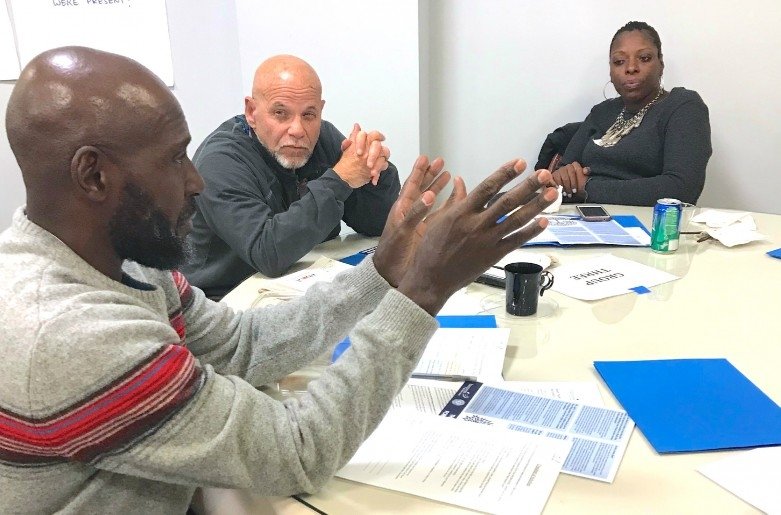Camden Residents Come Out to Support the Future of N.J. Media

Participants in a community forum at the Camden Conference Center on Nov. 16 turned up the heat on the Civic Info Bill, peppering Free Press Action Fund advocates with queries about what the proposed legislation would do.
By the end of the evening, support for the legislation — which would strengthen local journalism throughout New Jersey — was stronger than it had been at the start. Many of the 20-plus people in attendance left vowing to write their lawmakers in favor of the idea or to attend lobbying days in Trenton to support it.
After detailing the intricacies of the Civic Info Bill, Mike Rispoli, director of Free Press Action Fund’s News Voices: New Jersey program, facilitated a round of questions from Camden County residents.
Here are some of the great questions people posed:
Question: The fund would use proceeds from the sale of New Jersey’s public-television licenses to support a range of projects. How would this work improve day-to-day coverage of Camden’s government and schools?
Answer: A prime goal of the Civic Info Consortium, as developed by Free Press Action Fund, is to find innovative ways to improve the news coverage of underserved urban areas. To be candid, no nonprofit fund that gets perhaps $20 million a year from the state could completely replace all of the reporting positions that have disappeared from New Jersey newsrooms in the last decade. But the fund would support both community-based initiatives to strengthen local reporting — as well as technological innovation aimed at reaching people with local news where they live and on the devices they prefer.
Question: How would the consortium decide which projects to fund, and what would prevent its decisions from simply reflecting the whims of Trenton’s ruling politicians?
Answer: The bill builds as high a firewall against undue political meddling as it possibly could, ensuring the consortium would operate with complete transparency and accountability. While legislative leaders and the governor would appoint members to the nonprofit’s board, those political appointees would be outnumbered by representatives of the state’s research universities (which would play a major role in the consortium) and by at-large appointees representing public stakeholders.
Question: And what would the role of the universities be?
Answer: Five leading higher-education institutions would partner with grant applicants — community groups, media outlets, civic technologists, etc. — to bolster their proposals through access to university research and scholars, and to help evaluate the impact of the projects the fund would support.
Question: Who would decide who gets grants, and would they ensure that the money is distributed all around the state? (Given the location of the forum, the unstated implication here was: How can we trust that South Jersey won’t once again be shortchanged?)
Answer: The fund would have an executive director and staff to solicit and vet proposals, just as a private foundation does. The bill’s language ensures that the consortium’s investments would be spread around the state, but it leaves the nonprofit some discretion to invest in the most promising, innovative ideas, no matter where they arise.
Forum participants were satisfied with that last answer, but made a follow-up point: This approach would work only if the nonprofit’s staff made it a priority to a) publicize the learnings from impactful projects and b) work to replicate that success in other communities.
People also stressed that the fund’s staff should provide technical assistance to community groups and community members that have little to no experience in writing grant applications.
Attendees also discussed times when their local news-and-information system delivered the goods for them, and times when it failed — all as a way to turn their personal experiences into a grassroots appeal to lawmakers to support the legislation.
Among the successes cited:
- School districts streaming board-of-education meetings on Facebook Live so that people who can’t attend in person are still informed.
- Willingboro Township’s excellent system for keeping senior citizens informed about activities, which includes both written materials and trusted “connectors” to spread the word.
- Schools that send materials home with students to let parents know what’s going on.
Among the failures cited:
- Important government meetings that happen without any advance word or news reports besides legal notices buried deep in the back of local newspapers with much-diminished circulation.
- The brewing of a serious mold problem in a South Jersey school district that drew no coverage until schools had to be closed for a week. Then, there was little follow-up reporting on the pace and cost of the remediation.
- Lack of both media coverage and publicity about events run by the Coopers Ferry Partnership, which was established to revive Camden.
- The disappearance of beat reporters from some South Jersey townships, leaving communities’ entrenched “oligarchies” as the only source of information about local government’s doings.
Forum participants characterized some stories as both successes and failures, depending on which local news outlet you followed.
Camden residents talked about a murder investigation that was hampered when residents were reluctant to serve as witnesses. One outlet, residents said, wrote about this dynamic in a condemning tone as an example of “stop snitching” culture.
Another outlet, they said, reported the same facts, but provided more context about the legitimate fears that might discourage a Camden resident from talking to police.
This example led to discussion about the value of news coverage that’s written by journalists who are rooted in local communities and understand their history and cultural crosscurrents.
The Civic Info Bill is still alive in the legislature’s lame-duck session, and we’re hearing that if enough people contact the legislative leaders’ offices before the end of the year, the Higher Education Committee will hold a hearing on the bill.
The final Free Press Action Fund community-action forum of 2017 will be held on Thurs., Dec. 7, in Trenton. RSVP today.